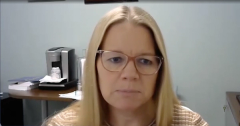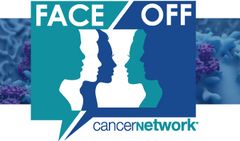
Asciminib Offers Additional Tool to Treat CML-CP
Talha Badar, MBBS, MD, discussed how results from the phase 3 ASCEMBL study of asciminib will impact clinical practice in treating chronic myeloid leukemia in chronic phase.
Episodes in this series

As part of CancerNetwork’s Face-Off video series, Talha Badar, MBBS, MD, assistant professor of oncology, Mayo Clinic, discussed how clinical practice may change following the readout of the phase 3 ASCEMBL study (NCT03106779).
The trial compared treatment with asciminib (Scemblix) versus bosutinib (Bosulif) in patients with chronic myeloid leukemia in chronic phase (CML-CP) after ≥2 prior tyrosine kinase inhibitors (TKIs).
Badar: So, I will answer this question in context to the other abstract which was presented as an oral abstract [at the 2022 American Society of Hematology Annual Meeting and Exposition] by Dr. Jubour, evaluating the outcome of patients who had progressed, CML patients with chronic phase who progressed on second-line TKI. At [The University of Texas] MD Anderson [Cancer Center], a large pool of CML patients with chronic phase and evaluated outcomes and variables that predict response in these patients.
So what they found out, which is notable and somehow related to the study, patients having said progression on secondary TKIs, like bosutinib, erlotinib [Terceva], defactinib, and if they are switched to ponatinib-based therapy that tends to have a better outcome. So in patients who are progressing on second-generation TKI, it made more sense to use the third generation or novelty TKI then switching from 1 second-generation TKI to another second-generation TKI.
So let's say if you're a patient who had a prior progression on a second-generation TKI, it doesn’t make sense to put them into bosutinib, you would like to put them on a better TKI therapy. In that scenario on that paper, it was ponatinib. I assume. extrapolating the data, we have the activity and efficacy of anatomy and patient TC15i I in general, in 2 prior lines of TKI therapy. In clinics, you come across a patient who had progression on second-generation TKI or ponatinib in that scenario. Ponatinib is challenging, with some adverse effect profile in patients who have cardiovascular disease, which is not better control. And there are issues with tolerance and toxicity. So in that scenario, if you have to choose asciminib would be ideal in terms of having that response.
The caveat to this is there is no head-to-head trial with a similar when printed and we won't be able to have 1 in that space. But it's still something to consider and some tool available to manage and cater to those patients.
Transcription edited for clarity.
Newsletter
Stay up to date on recent advances in the multidisciplinary approach to cancer.






































